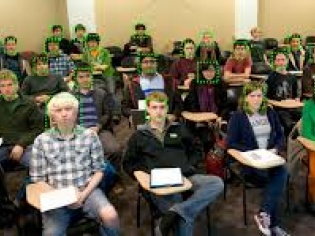-
Team TechTree
18:30 14th Sep, 2016
Professor Uses Face Scanning Technology To Find Bored Students | TechTree.com
Professor Uses Face Scanning Technology To Find Bored Students
A computer science professor is using facial and expression recognition technology to gauge the interest levels of students in his classes.

Do you remember last time when you were bored in class? Most students find class lessons boring, no matter how studious or brilliant he or she is.
Wei Xiaoyong, a science professor at Sichuan University in China realized this fact of life. He said he is using facial recognition technology on his own students, determining exactly who’s day-dreaming about going out for a movie class, or yearning for a weekend gate-away.
The scanning approach gauges the emotion on your face over time, helping Wei refine his lectures so that he doesn't lose your interest.
“Five years ago, when I came to this university to teach, I came up with the idea of using facial recognition for attendance checks,” said Wei in Digital Trends report. “Over time, I realized there was other information we could gather from this data. For example, it is possible to figure out social networks in the classroom by looking at which students sat next to each other,” he added in the Digital Trend report (read it here).
WEi Also disclosed that most of the students taking up course because of this unique technique of teaching. Hence, the university “offer them three weeks to get used to new classes, so if they don’t like the system they can drop the class. After that three week period, we ask them to sign a consent form for video” he added.
Xiaoyong developed the program on his own, which categorizes student’s expressions as either “happy” or “neutral,” using a “curve” that scans every impressionable youngster’s face. If it sounds like a weird bit of voyeurism -- or a teacher acting too much like a cop with the help of technology -- take a breath, and give Xiaoyong a chance. He told reporters the “tool can be used for a range of social sciences, psychological work and by educational researchers.”
The program helps Xiaoyong to evaluate his own performance: If he gets a room full of deadpan stares, he’ll know when to move onto a different topic, or perhaps entertain students one or the other way to bring back their attention.
It's not guaranteed to be completely effective, of course (what if you're particularly stoic?), and it's easy to see students being nervous about the privacy ramifications of scanning faces. Wei is sharing his approach with other Chinese universities, however, which suggests that it's successful enough. And the underlying tech isn't limited to the classroom -- Wei sees it applying to psychology, social sciences and anywhere else where measuring emotional changes could be useful.
TAGS: biometrics, Face Swap, Scanners
News Corner
- DRIFE Begins Operations in Namma Bengaluru
- Sevenaire launches ‘NEPTUNE’ – 24W Portable Speaker with RGB LED Lights
- Inbase launches ‘Urban Q1 Pro’ TWS Earbuds with Smart Touch control in India
- Airtel announces Rs 6000 cashback on purchase of smartphones from leading brands
- 78% of Indians are saving to spend during the festive season and 72% will splurge on gadgets & electronics
- 5 Tips For Buying A TV This Festive Season
- Facebook launches its largest creator education program in India
- 5 educational tech toys for young and aspiring engineers
- Mid-range smartphones emerge as customer favourites this festive season, reveals Amazon survey
- COLORFUL Launches Onebot M24A1 AIO PC for Professionals







TECHTREE